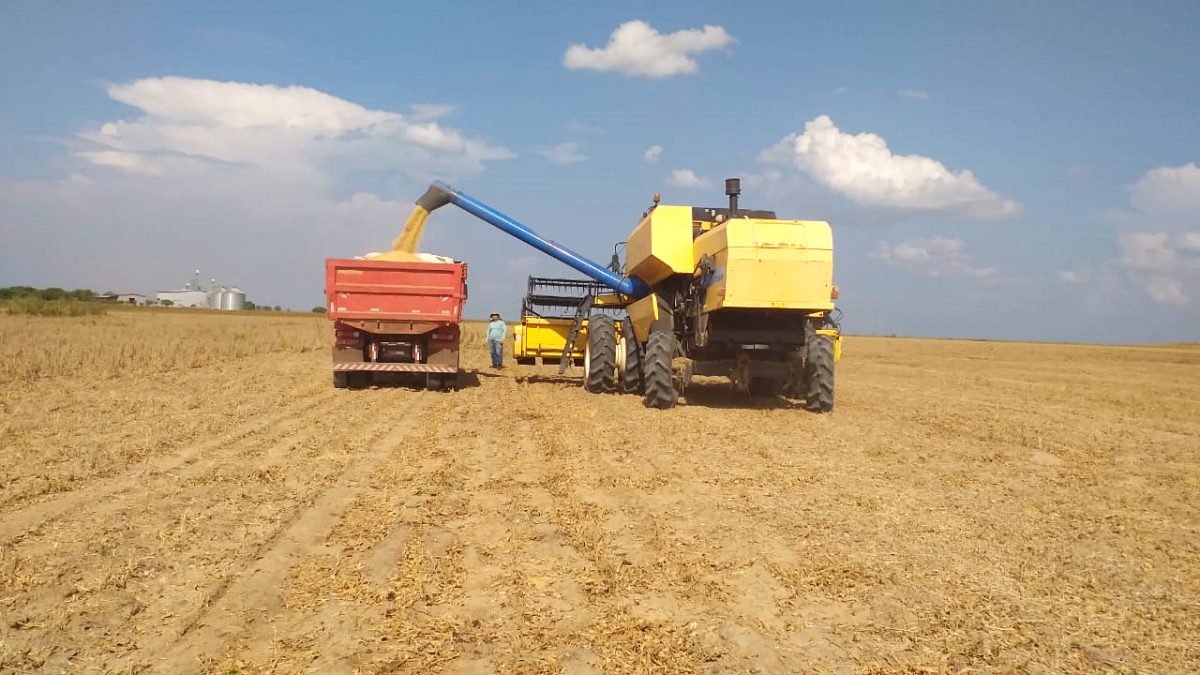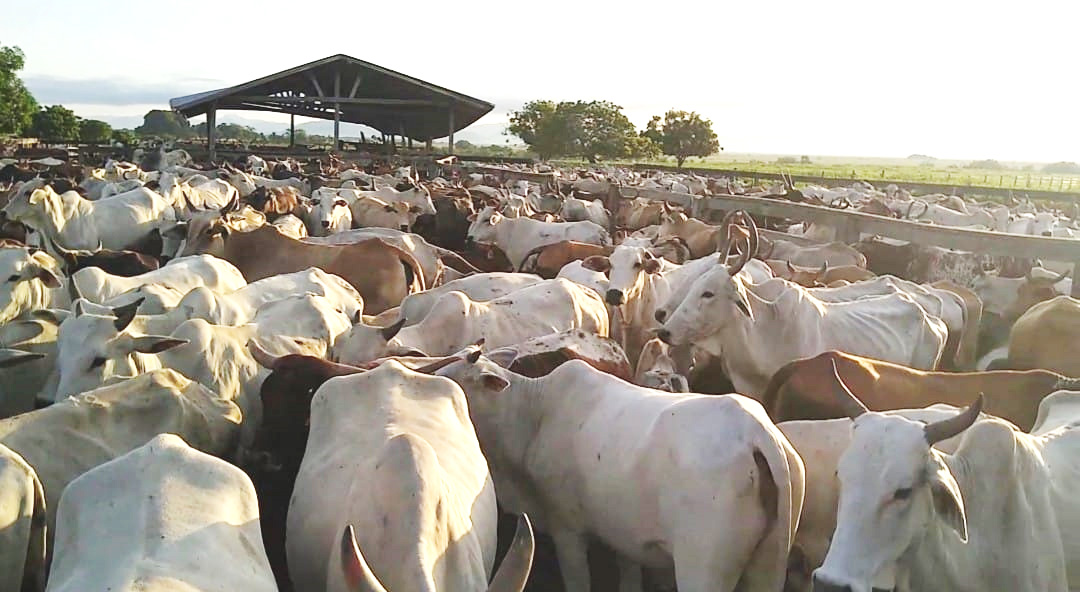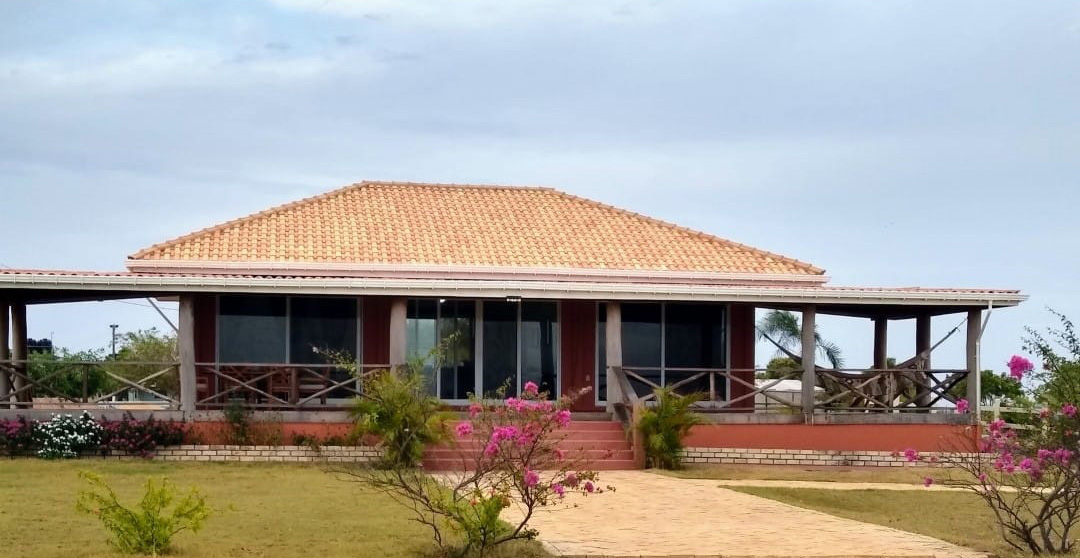After the successful growth of a number of crops including soya beans and watermelons, Guyana’s first privately-owned integrated mega-farm, the Santa Fe Farm in Region Nine, is rolling out a number of expansion plans for different crops this year but has highlighted that proper roads and transportation logistics continue to be a challenge.
“The Farm achieved notable success in 2023 with the harvest of 500 acres of soybeans, all of which was sold in the domestic market in keeping with government’s goal of reducing food imports in Guyana,” Director of Santa Fe Farms, Eldon Bremner, told the Sunday Stabroek in an interview on Friday.
“While the farm experienced success with the growing of the soybeans, it faced challenges in getting the crop to Georgetown due to the high cost of freight,” he added.
Building upon this achievement, the farm – owned by Barbadian businessman Sir Kyffin Simpson – is preparing to replant another crop of soybeans with the expectation that the upgrades to the bridges and road being done by the government, will help in bringing down the cost of transportation. Moreover, projections for 2024 include “a significant increase in the production of watermelons, sweet potatoes and cassava and the cultivation of passion fruit.”
The farm’s director explained that they have a strategy for long-term growth, and this includes the rollout of other crops.
“The Santa Fe Farm will initiate the planting of citrus in April, comprising limes, oranges, and tangerines, on a commercial basis.” He said that they are also working with a, “large Brazilian citrus grower to develop a first-class citrus nursery,” at Santa Fe, to be able “to supply high quality citrus trees to the domestic and foreign markets” while remaining committed to sustainable agriculture.
The Sunday Stabroek has followed the development of the farm from its inception when it began in 2011, promising to be an integrated mega-farm and optimistic that both the crops and livestock investments would be successful, as the lands here are arable.
Then, when most of its critics had seen the large swathes of land in Region Nine as barren and not suitable for farming, the company had said it had a vision for the transformation of thousands of acres of land into a model farm. It has focused on crops, livestock, aquaculture and fruits.
Around this same time last year, during an interview, the farm’s principals had informed that Santa Fe Farm had successfully grown and exported over 12,000 tons of paddy to Brazil, in what was a pioneering project for the region but was forced to scale back on production in 2020 because of the COVID-19 pandemic.
After being hard hit by the COVID-19 pandemic and the resultant constriction of the global supply chain, Bremner had explained that they were then preparing to resume work, with eyes set on assisting Guyana to cut its food imports by 2025.
The decision to restart had been taken during a 2022 a visit by President Irfaan Ali and several Caricom Heads of State, and the company announced that it would be preparing some 600 acres of land for the planting of soybeans. That project was a notable success, save for the logistics aspects and highlights the plight of small farmers in that region in getting markets for their produce.
Climate and drought
As it relates to livestock, Bremner said that the farm continues to expand its livestock operations, which includes cattle, sheep, and pigs to be able to meet the growing market demands while upholding stringent standards of animal welfare.
But the livestock rearing faced a threat this year due to climate issues as the current drought that the area is experiencing has been challenging.
“The current drought in the area has caused serious challenges in the availability of water for the livestock,” Bremner stated. He added, “Most water lakes have dried up and the farm is presently installing additional water wells and also upgrading existing wells to be able to satisfy the water needs for the livestock. The drought has also created issues with the bush fires which has affected grazing pastures.”
Agri-tourism
And where in 2020 the 2019 plans to venture into agri-tourism had to be suspended because of the pandemic, Bremner said those plans have picked back up and steady gains are being made.
“Tourism has been the worst affected of all major economic sectors across the region, the country and the world by COVID-19. One of the biggest setbacks for us at Santa Fe Farm has been the delay in embarking on its tourism initiative and the obvious economic spin-offs,” then Santa Fe Manager, Yolanda Vasconcellos had related.
In 2019 she had said that the farm had been preparing to expand and embark on tourism, in particular agro-tourism, where it would be open to visitors for the purposes of “enjoyment, education and other active involvement.”
“Agri-Tourism is the next big thing at Santa Fe Farm. This allows us to share the real rural life of the Rupununi savannahs and the experience of life on a farm, local food and culture,” she said.
But the launch of the initiative, scheduled for the Easter 2020, was hampered as the world grappled with the effects of the COVID pandemic. “COVID has led to significant uncertainty and chaotic conditions in both of the industries that we at Santa Fe directly operate in – agriculture and tourism,” Vasconcellos had lamented.
The farm’s diversification to agro-tourism was designed to give visitors, both local and foreign, a “Region Nine experience they would never forget.”
“The Santa Fe Farm is the ideal place to enjoy a taste of farm life with all the amenities of a resort. We offer unforgettable experiences in a rustic setting in the northern savannahs, friendly service, great food, and a look at life on a real ranch. At Santa Fe we offer more than just relaxation and scenic views. We are the perfect place to experience the ranch life in more ways than you might expect,” Vasconcellos had said.
“Enjoy catch and release fishing, or spend a day horseback riding or hiking through the farm’s many trails. We have a number of other activities and trust me when I say that you will not be bored because they include hiking, boating, riding… And if you just want serenity, Santa Fe has that too because there is no other experience that lying in the lush grass or in your room and star gaze. You can also relax in a hammock from the verandah of the Lodge,” she emphasised.
According to Vasconcellos, their two-bedroom two-bathroom eco-lodges capture a scenic view of the Pakaraimas Mountain range and their staff will cater to the vacationer’s every need, giving them a five-star hotel experience with all the amenities of an eco-lodge.
She argued that Santa Fe Lodge is ideal for a family getaway, a quick trip with friends for a weekend, safari stop overs and a rest stop for hikers, bikers, caravan travellers. It can be accessed by road.
On Friday, Bremner echoed most of what the farm manager had said, adding that amidst its agricultural pursuits, the Santa Fe Farm lodge continues to gain in popularity, earning stellar reviews from guests.
“With a focus on providing exceptional hospitality amidst the picturesque backdrop of the farm’s surroundings, the lodge stands as a testament to the farm’s commitment to excellence across all facets of its operations. Santa Fe Farm is committed to sustainable farming practices, exceptional crop production, and unparalleled guest experiences,” he declared.
“The Santa Fe Farm continues its goal of enhancing agricultural productivity, expanding livestock operations, and elevating the guest experience at its lodge,” he added.
The project, founded by prominent Barbadian investor, Sir Kyffin Simpson, who owns the Interamerica Trading Corporation that is responsible for the investment at Santa Fe, has seen the transformation of 29,000 acres of land.









